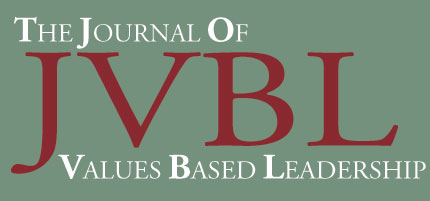- TABLE OF CONTENTS
1st Source Bank: A Partner from the Great Depression through the Economic Recession
(An analysis of a community bank rebuking the norm of collapse and bailout)
Elizabeth Gingerich, J.D., Editor, Journal of Values Based LeadershipFirst (1st) Source Bank has defied the odds by escaping the plight of so many community banks without expending government aid. Ethics, stakeholder protection and respect, and sense of community, have all been contributing factors to this hometown bank’s survival and growth.
Authentic Identity: The Essence of How Successful “Ecopreneurs” Communicate
Chantal B. Schauch, MA, BCOM, Founder & President of ImmerseUs CommunicationsEntrepreneurs can no longer ignore the environmental consequences of their industrial practices. Those that do will most certainly fail. Ms. Schauch’s research concentrates on the five distinguishing traits of a successful “ecopreneur”: (1) grounded by values and living by values; (2) belief in cause and passion for cause (3) resolute in mission and consistent across mission; (4) like-minded relationships and transparent relationships; and (5) learning for life and returning for life.
Accounting Ethics Education: An Authentic Value-Based Approach
Otto H. Chang, Ph.D., CPA, Dean, Richard T. Doermer School of Business and Management Sciences, Indiana University Purdue University, Ft. WayneIn order to infuse the teaching of ethics in the field of Accounting as well as within a business school curriculum per se, the traditional neo-classical method must move away from the microcosm of “self” in favor of consideration for “others.”
Values-Based Leadership and Happiness
(Enlightened Leadership Improves the Return on People)
Charles A. Millick, Assistant Professor of Management, Department of Business, Wheeling Jesuit UniversityAs employees assert a greater role in corporate management and decision-making, the successful institution recognizes and rewards these values while decentralizing the traditional workforce hierarchy.
Power, Responsibility & Wisdom: Exploring the Issues at the Core of Ethical Decision-Making and Leadership
Dr. Bruce Lloyd, Emeritus Professor of Strategic Management, London South Bank UniversityDecision-making ostensibly requires the exercise of Power. But that use of Power must be counterbalanced with Responsibility in order to make good decisions. Infusing Wisdom into the decision-making process necessarily incorporates an ethical component and involves both the identification and evaluation of relationships. Wise decision-making, therefore, requires the application of Wisdom which transcends simple, short-lived factual proficiency. It is this careful weighing of Wisdom, Power, Knowledge, and Responsibility which must guide our business leaders and be taught to our business students.
The Values-Based Revolution
David B. Brauer, Founder and CEO of Beechers Gelato and Gourmet Coffee, LLCThe key to creating a successful business is not guaranteed by disingenuously “going green” — especially if that term lacks certain definition. Rather, in addition to adopting principles of environmental stewardship, the values-based leader will discover that in freely espousing and implementing principles in the workplace, consumers with like values will often pay a product and/or service premium to patronize a business demonstrating like mindset. This is the true way of achieving business success.

